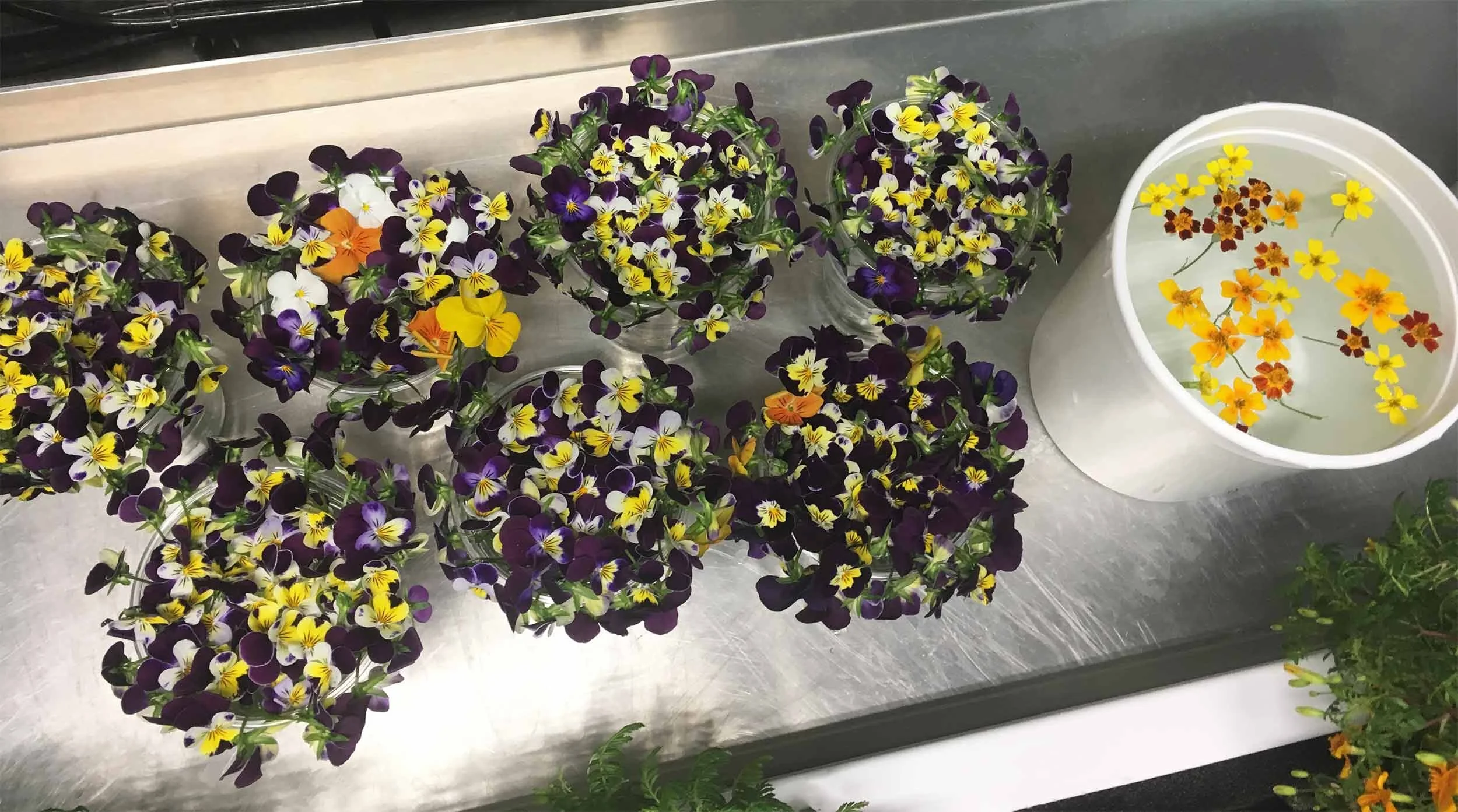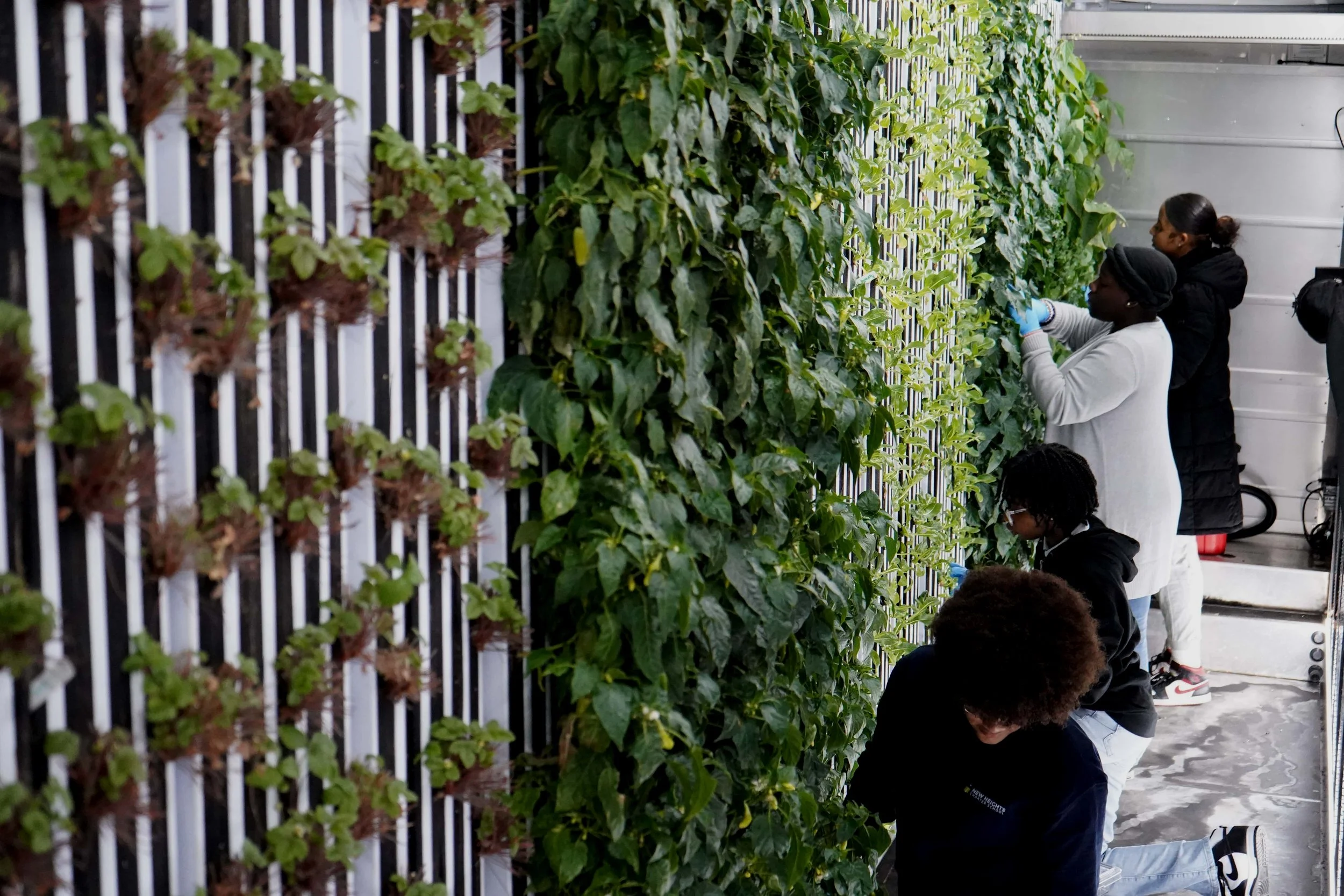Farm to School...to Career?
14 Questions with The Student Farmers and Farm Operators at Saint Joseph's College
The stars of our October webinar give us a sneak peek at the goings-on at the Saint Joseph’s farm! The college is using their campus hydroponic container farm as a platform for student employment and engagement, inspiring students to pursue sustainable lifestyles during and after college. The container farm is also the base for a groundbreaking new certificate course at the schools Institute for Local Food System Innovation, which aims to familiarize working adults with modern farming system to invigorate the Maine agricultural sector.
The Operator & The Innovator
Saint Joseph’s College would not have an amazing farm story to share without the hard work of two rockstar women. Hilary Lamkin manages the campus farm and a large campus eatery, Pearsons Cafe, where the produce is enjoyed by students and faculty. Maya Atlas is the Enterprise Startup and Operations Manager at Saint Joseph’s College, and works directly with Hilary to make the campus Freight Farm the foundation of the Institute for Local Food System Innovation. We asked them about the origins of the farming program and how the college integrates the farm into campus life.
Freight Farms: How did you first hear about Freight Farms?
Maya Atlas: We discovered Freight Farms when our college began discussions with Hannaford Supermarket about how we could to work together to innovate and support Maine’s food systems. At the time, Hannaford was running a pilot with Freight Farms; We found that the farm was better suited to a system like ours where we could staff, harvest, and serve everything within our immediate community, so we brought their farm to our campus.
“By allowing students to work fulfilling and demanding jobs on campus, they are able to spend more time within their community, work with their peers, and feed their friends and colleagues.”
FF: How does the farm fit into St. Joseph’s campus initiatives?
MA: The Freight Farm plugs really closely into our student employment initiatives. As a rural school with rigorous academic programs, providing valuable employment opportunities on campus is crucial. By allowing students to work fulfilling and demanding jobs on campus, they are able to spend more time within their community, work with their peers, and in this case, feed their friends and colleagues.
FF: How did you become involved in this project?
Hilary Lamkin: I was asked to help a former employee, Sue Wilson, in charge of our salad bar, to take on this project back in May of 2017. I was thrilled to take on the challenge! It’s been a wealth of education.
MA: I was hired to help the college build businesses and learning opportunities around food. My primary charges are to build a large hydroponic farm and a commercial kitchen on campus. The Freight Farm is the perfect case study for us as it already grows beautiful produce hydroponically and sells it back to the college. Working with the Freight Farm is helping me ensure that we scale and invest in systems that are proven to work with our operation and structure.
FF: Can you walk us through the process of getting your farm up and running?
HL: I attended Farm Camp in Boston and now serve as the manager and liaison between the farm and the school’s foodservice locations. We thought carefully about what we wanted to grow and found that a flat lettuce would be perfect for our deli/sandwich bar and found a leafy green that we loved for the salad bar. From there we got as much buy-in as we could from the chefs at our various locations to ensure that the products were well featured in the cafeteria and marketed accordingly.
“We got as much buy-in as we could from [our] chefs...to ensure that the products were well featured in the cafeteria and marketed accordingly.”
— Hillary Lamkin
FF: What are you growing today?
HL: During the school year, we mostly grow Green Star and Rouxai lettuce for the cafe. We also grow kale, arugula, dill, bok choy, and violas on a smaller scale.
FF: Can you walk our readers through your typical work week in the farm?
HL: Usually Mondays & Tuesdays are harvest days; Tuesdays & Wednesdays are transplant days; Thursdays & Fridays are seed and maintenance days. The students do the majority of everything in the farm depending on each student’s schedule and I oversee the operation and take care of product ordering and communication with the chefs. I also use farmhand® to monitor the farm on my phone every day.
FF: How have you promoted the farm’s presence on campus to current and prospective students?
MA: We think the Freight Farm is one of the coolest initiatives on campus (but we’re certainly a little biased). We have had students bring towers from the farm to prospective student events and our sustainability festival and we’ve met with tour guides and admissions counselors to tell them about the Farm and how we work to integrate it into the cafeteria. We find the best way to get people excited is to bring them into the farm, so we’re currently brainstorming more ways to get people into the space to experience it for themselves.
FF: What has been the response from the student body and faculty?
MA: When people discover the farm, they’re incredibly enthusiastic about it. There are a couple professors who have integrated the farm into their classes by offering tours or community-based learning projects that involve the farm. We’re even hoping to do a multi-disciplinary project with the Science, Education, and Marketing departments to support the buildout of a partnership with Native American Indian Reservations to help them get farms on reservation land. Projects like that really help people understand the value of the farm, and that enthusiasm spreads support for the program through the community better than a poster ever could!
“We find the best way to get people excited is to bring them into the farm.”
The Student Farmers
The Saint Joseph’s farm is operated by a half dozen students, all of whom are overseen by Hilary. Two of these students are Seniors Rebecca Barulli and Lily Lamkin (Hilary’s daughter!). Rebecca is a Environmental and Marine Science major with minors in Biology and Sustainability Studies. Lily is a Nursing major.
FF: How did you first hear about the farm on your campus?
Rebecca Barulli: I first heard about the farm on campus through working at Pearson’s Cafe. I was able to visit the farm and immediately wanted to start working in it.
Lily Lamkin: I first heard about the farm through my mother, Hilary Lamkin, who is the Farm Operator. She was tasked with getting it up and running but needed some help so I started volunteering.
FF: What motivated you to start working at the farm?
RB: I have been studying hydroponics and how this new, sustainable form of agriculture could change the food systems of the future. Since getting a tour, the farm has changed my college experience completely: The opportunities and experiences I have gained through working in the farm has shifted my focus of study.
LL: After we got the farm all ready to run, I learned so much about the process of growing lettuce and other greens hydroponically that I fell in love with it and eventually became employed as the student Freight Farm lead.
FF: Did you have any farming experience before this job?
RB: Before I started working in the farm, I had no experience in agriculture or farming at all. I grew to love working in the farm and learning all that it had to offer.
LL: I had some experience volunteering with traditional farming, but had never done hydroponic farming before.
“Working in the hydroponic farm has helped me improve on my time management skills as well as my teaching skills.”
- Lily Lamkin
FF: Other than learning how to grow food hydroponically, what skills or knowledge have you gotten from your work?
RB: Working in the hydroponic farm has been extremely beneficial for my educational experience at St Joseph’s. In my sustainability classes, sustainable agriculture was one of the largest focuses on how to change food systems. Getting to work in a farm where we grow hydroponically has helped me learn more about how the college’s food system works and how the things I learned in my courses can make a significant impact on the whole college’s sustainability.
LL: Working in the hydroponic farm has helped me improve on my time management skills as well as my teaching skills, both of which are crucial to my future career as a nurse. Even with my busy class schedule, I make sure I plan enough time to work in the farm and get everything done so we don’t fall behind schedule. I have also trained some of the students and given tours of the farm to members of the community. This has helped me become a better educator.
FF: What would you say is the most pressing issue in food and agriculture that you’d like to see solved?
RB: Climate change is coming, sooner rather than later. Our national food system is tied to resources around the world and also causes an immense increase of CO₂ levels into the atmosphere. If we were able to solve this problem through localizing food systems and decreasing CO₂ outputs, we could change the severity of climate change.
LL: I agree with Rebecca. Climate change is a huge threat to our planet right now and supporting the localization of food systems would help to decrease CO₂ emissions. Additionally, this climate change solution also has health benefits. Higher nutrient levels, fresher produce, and less use or no use of pesticides are a few of the added benefits of local food sources.
FF: How do you think your experience working at the farm will affect your life after school?
RB: Working at the farm has changed my career focus. I think I will be pursuing a career in hydroponic or aquaponic growing after I graduate in December.
LL: Although I will be working in a hospital, I still hope to come back and visit the Freight Farm. I helped it become a reality here at Saint Joseph’s College and I will always be passionate about its growth and success.
Want to learn more?
View our webinar with Hillary, Maya, and the student farmers!















